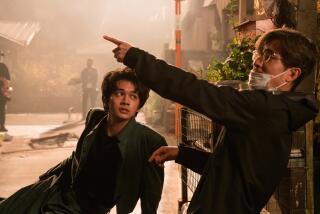Review: Chinese animation ‘Big Fish & Begonia’ echoes the visual wonders of Hayao Miyazaki
For animation fans counting the days until the forthcoming release of the next film by brilliant Japanese animator Hayao Miyazaki, “Big Fish & Begonia” is the best possible news.
It is visually dazzling and made very much in the Miyazaki mode, including an intrepid young heroine and the cultural specificity that characterizes works like the Oscar-winning “Spirited Away.” But this surpassingly beautiful film turns out to be not Japanese at all.
Rather, as co-directed by Xuan Liang and Chun Zhang, it marks a major step forward for Chinese feature animation, as well as the culmination of a journey that took the filmmakers more than a dozen years to complete.
Because the scope of this project was unprecedented for China, where animation is thought of as strictly for kids, the filmmakers had great difficulty raising money. Only when a desperate plea for funds on the social media site Weibo led to a successful crowd-funding campaign (people did everything from pledging a month’s salary to donating a trousseau) did a major financier step forward.
The finished film ended up grossing nearly $90 million in its Chinese release, a very impressive in-country sum for what is basically an independent film that literally began as an actual dream one of the directors had.
Inspired by Chinese mythology and cultural traditions, “Big Fish & Begonia” combines a stirring adventure with awe at the sacredness of the natural world and metaphysical speculation on the nature of life and death.
It’s a heady combination, and the film’s detail-filled plot can be so intricate it’s hard at times to figure out exactly what is going on. But the visuals are so epic and breathtaking, the supporting characters so fantastical, that viewers are unlikely to be troubled.
The film’s central conceit is that there is a mystical race of people, controllers of the tides and the Earth’s seasons, who live so far under the sea that their sky is at the bottom of our ocean.
At age 16, the young adults of this universe take part in a rite of passage where they turn into red dolphins and explore the oceans of our world, simply observing and being careful to avoid human contact at all costs.
A young woman named Chun (voiced in the subtitled Mandarin version by Guanli Ji, in the dubbed English by Stephanie Sheh) is, however, not so fortunate.
Entangled in an elaborate fishing net and headed for death, she is cut free by an intrepid young man named Kun (Weizhou Xu/Todd Haberkorn). Sadly, that action is Kun’s last, and to Chun’s horror she finds him dead on the ocean floor.
Feeling understandably responsible, Chun returns to her world to see if anything can be done to bring Kun back to the living.
As determined as she is bold and fearless, Chun gains an audience with the powers that be and is told that while bringing Kun back is possible, it violates all the universe’s rules and will have serious, unforeseen consequences.
Undeterred, Chun takes possession of Kun’s soul in the form of a baby fish. Her task is to keep that fish alive until it grows to full size, and until that time their lives are so linked that if anything happens to Kun she will be affected as well.
Aided, albeit reluctantly, by a friend named Qui (Shangqing Su/Johnny Yong Bosch) who is also her secret admirer, Chun discovers just how far a caring and kind heart can take one, and what happens when the universe pushes back.
Though hampered by its pedestrian title (the second half comes from a gift Chun has inherited from her grandfather for making begonia plants grow to phenomenal size), this film’s magic extends to all things visual.
It’s not just the strange creatures that Chun interacts with on her quest, which is to be expected, but even the kind of circular housing she and her family live in, apparently inspired by the Hakka Earth Building Complex in China’s Fujian province.
It’s all strangely wonderful, and it will take your breath away if you give it the chance.
------------
‘Big Fish & Begonia’
Rating: PG-13, for thematic elements and brief nudity
Running time: 1 hour, 45 minutes
Playing: in limited release
More to Read
Only good movies
Get the Indie Focus newsletter, Mark Olsen's weekly guide to the world of cinema.
You may occasionally receive promotional content from the Los Angeles Times.











